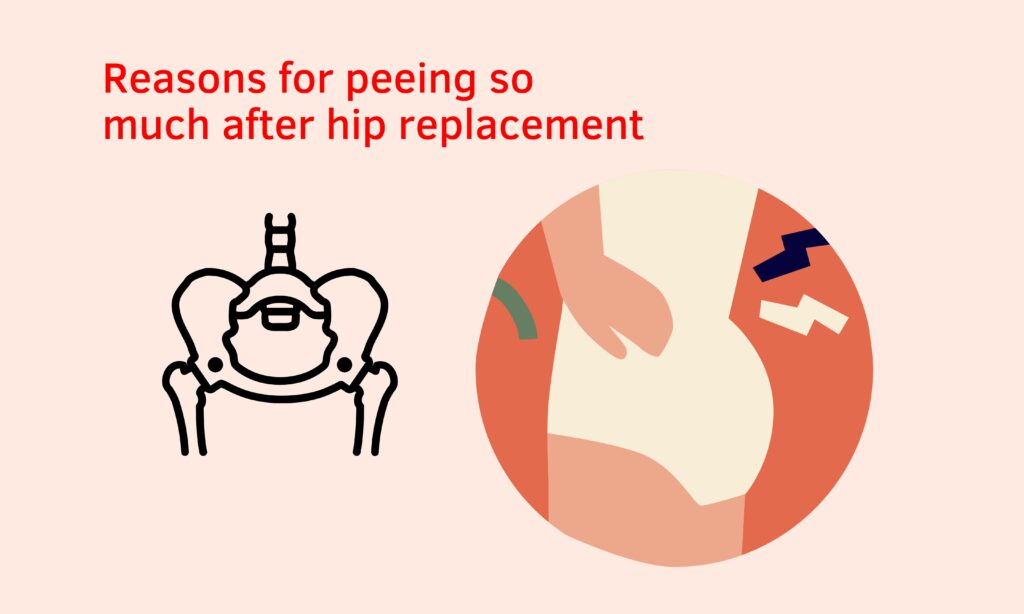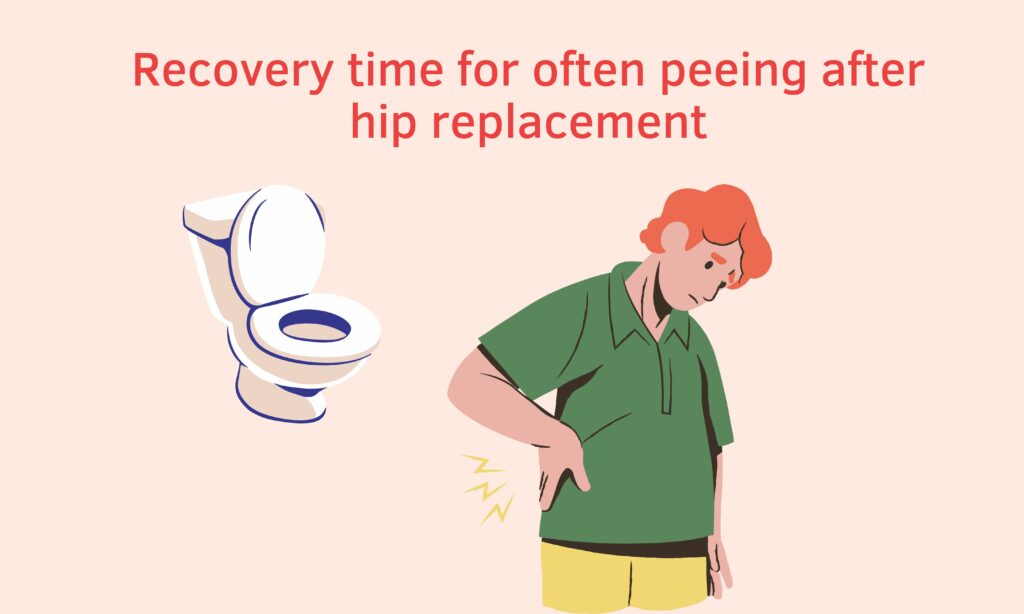
If you’re wondering why am I peeing so much after hip replacement surgery, there are several possible explanations. It’s not uncommon for patients to experience an increase in urinary frequency and urgency after undergoing this procedure, and the following factors may contribute to this issue.
- Firstly, pain and discomfort can cause stress on the bladder and lead to an increased need to urinate. After hip replacement surgery, patients may experience pain and soreness in the hip area, which can radiate to the lower abdomen and pelvic region. This discomfort can put pressure on the bladder and cause it to become more sensitive.
- Secondly, the use of certain medications during and after hip replacement surgery can affect urinary function. Pain medications and anesthesia can slow down bladder contractions, leading to a build-up of urine in the bladder and an increased need to urinate. Diuretics, which are commonly used to treat fluid buildup after surgery, can also contribute to increased urinary frequency.
- Thirdly, hip replacement surgery can lead to a disruption of the normal nerve pathways that control urinary function. The surgery can cause temporary nerve damage, which can result in bladder dysfunction and an increase in urinary frequency.
- Finally, dehydration can also contribute to increased urinary frequency after hip replacement surgery. It’s important to stay hydrated and drink plenty of fluids after surgery to prevent dehydration and promote optimal bladder function.
If you’re experiencing excessive urination after hip replacement surgery, it’s important to speak with your healthcare provider to determine the underlying cause and appropriate treatment options. In some cases, medication adjustments or bladder training exercises may be recommended to improve urinary function. In more severe cases, additional diagnostic tests or surgical interventions may be necessary.
In conclusion, if you’re wondering why am I peeing so much after hip replacement surgery, there are several possible explanations. Pain and discomfort, medication use, nerve damage, and dehydration can all contribute to increased urinary frequency. It’s important to speak with your healthcare provider to determine the underlying cause and appropriate treatment options to improve urinary function and promote optimal recovery after surgery.
Things to look out for after hip replacement
After undergoing hip replacement surgery, it’s important to be aware of potential complications and know what to look out for. While most patients have successful recoveries, there are several issues that can arise, including urinary frequency, which can be a cause for concern.
1.Infection
One of the most common issues after hip replacement surgery is infection. Signs of infection can include fever, chills, redness, swelling, and drainage at the surgical site. If you experience any of these symptoms, it’s important to contact your healthcare provider immediately as untreated infections can lead to serious complications.
2.Swelling
Another potential complication is blood clots, which can cause pain and swelling in the affected leg. Blood clots can also cause shortness of breath, chest pain, and coughing up blood. If you experience any of these symptoms, seek immediate medical attention as blood clots can be life-threatening.
3.Urinary frequency
Urinary frequency, as mentioned earlier, is also a common issue after hip replacement surgery. It is important to monitor this symptom and communicate with your healthcare provider if it persists or is accompanied by pain, burning, or blood in the urine. These could be signs of a urinary tract infection or other issues related to urinary function.
Other complications to look out for after hip replacement surgery include dislocation of the new joint, nerve damage, and bone fractures. If you experience sudden onset of pain, inability to move the affected leg, or unusual sensations such as tingling or numbness, seek medical attention immediately.
In conclusion, after undergoing hip replacement surgery, it’s important to be aware of potential complications and know what to look out for. Infection, blood clots, urinary frequency, dislocation, nerve damage, and bone fractures are all possible issues that require prompt medical attention. If you experience any of these symptoms or have concerns about your recovery, it’s important to communicate with your healthcare provider to ensure the best possible outcome.
Reasons for peeing so much after hip replacement

It’s common for patients to experience an increase in urinary frequency after undergoing hip replacement surgery. While it can be a temporary issue, there are several possible reasons why am I peeing so much after hip replacement, including the following:
- Medications – Pain medications, diuretics, and anesthesia used during and after surgery can affect urinary function. Pain medications and anesthesia can slow down bladder contractions, leading to a build-up of urine in the bladder and an increased need to urinate. Diuretics can also contribute to increased urinary frequency by increasing the amount of urine produced by the kidneys.
- Dehydration – Dehydration can also contribute to increased urinary frequency after hip replacement surgery. It’s important to stay hydrated and drink plenty of fluids after surgery to prevent dehydration and promote optimal bladder function.
- Bladder irritation – The surgical trauma caused by hip replacement surgery can cause bladder irritation, leading to an increased need to urinate. This is especially true if the surgery was performed using a posterior approach, which can put pressure on the bladder and lead to temporary bladder dysfunction.
- Nerve damage – Hip replacement surgery can lead to a disruption of the normal nerve pathways that control urinary function. The surgery can cause temporary nerve damage, which can result in bladder dysfunction and an increase in urinary frequency.
- Urinary tract infection – Urinary frequency can also be a sign of a urinary tract infection, which can occur after surgery due to catheter use or other factors. Other symptoms of a urinary tract infection can include pain or burning during urination, blood in the urine, and fever.
If you’re experiencing excessive urination after hip replacement surgery, it’s important to speak with your healthcare provider to determine the underlying cause and appropriate treatment options. In some cases, medication adjustments or bladder training exercises may be recommended to improve urinary function. In more severe cases, additional diagnostic tests or surgical interventions may be necessary.
In conclusion, there are several reasons why am I peeing so much after hip replacement surgery, including medications, dehydration, bladder irritation, nerve damage, and urinary tract infection. It’s important to speak with your healthcare provider if you’re experiencing excessive urination to determine the underlying cause and appropriate treatment options to improve urinary function and promote optimal recovery after surgery.
Recovery time for often peeing after hip replacement

Recovery time for often peeing after hip replacement can vary depending on the underlying cause of the increased urinary frequency. In most cases, excessive urination after hip replacement surgery is a temporary issue that improves within a few weeks to a few months after surgery.
If the cause of increased urinary frequency is due to medication side effects, recovery time may be as simple as adjusting or discontinuing the medication. Dehydration can also contribute to increased urinary frequency, so drinking plenty of fluids can help improve recovery time.
If the underlying cause of excessive urination is related to bladder irritation or nerve damage caused by surgery, recovery time may take longer. It’s important to work with your healthcare provider to develop a plan for managing urinary dysfunction and promoting optimal recovery after hip replacement surgery.
In some cases, bladder training exercises may be recommended to help improve bladder function and decrease urinary frequency. These exercises may include scheduled voiding, Kegel exercises, and pelvic floor muscle training.
If the underlying cause of excessive urination is related to a urinary tract infection, recovery time will depend on the severity of the infection and the effectiveness of treatment. Antibiotics are typically prescribed to treat urinary tract infections, and symptoms should improve within a few days to a week of starting treatment.
In rare cases, excessive urination after hip replacement surgery may be a sign of a more serious underlying condition, such as bladder or prostate cancer. In these cases, recovery time will depend on the type and severity of the underlying condition and the effectiveness of treatment.
In conclusion, recovery time for often peeing after hip replacement surgery will depend on the underlying cause of the increased urinary frequency. In most cases, it’s a temporary issue that improves within a few weeks to a few months after surgery. Working with your healthcare provider to develop a plan for managing urinary dysfunction and promoting optimal recovery is key to improving recovery time and ensuring a successful outcome after surgery.
FAQs
- Q: Why am I peeing so much after hip replacement surgery?
A: Increased urinary frequency after hip replacement surgery can be caused by several factors, including medication side effects, dehydration, bladder irritation, nerve damage, and urinary tract infection.
- Q: How long will I experience increased urinary frequency after hip replacement surgery?
A: Recovery time for often peeing after hip replacement surgery can vary depending on the underlying cause of the increased urinary frequency. In most cases, excessive urination is a temporary issue that improves within a few weeks to a few months after surgery.
- Q: Can excessive urination after hip replacement surgery be a sign of a more serious underlying condition?
A: In rare cases, excessive urination after hip replacement surgery may be a sign of a more serious underlying condition, such as bladder or prostate cancer. If you’re experiencing excessive urination after surgery, it’s important to speak with your healthcare provider to determine the underlying cause and appropriate treatment options.
- Q: What can I do to manage excessive urination after hip replacement surgery?
A: Depending on the underlying cause, management options for excessive urination after hip replacement surgery may include medication adjustments, bladder training exercises, and drinking plenty of fluids. It’s important to work with your healthcare provider to develop a plan for managing urinary dysfunction and promoting optimal recovery after surgery.
- Q: How can I prevent excessive urination after hip replacement surgery?
A: While some factors contributing to excessive urination after hip replacement surgery may be beyond your control, there are steps you can take to help prevent dehydration, such as drinking plenty of fluids, and practicing bladder training exercises to help improve bladder function.
- Q: Should I be concerned if I’m experiencing excessive urination after hip replacement surgery?
A: While increased urinary frequency is a common side effect of hip replacement surgery, it’s important to speak with your healthcare provider if you’re experiencing excessive urination to determine the underlying cause and appropriate treatment options. In rare cases, excessive urination may be a sign of a more serious underlying condition.
To summarize
In summary, why am I peeing so much after hip replacement surgery? Increased urinary frequency after hip replacement surgery is a common issue that can be caused by several factors, including medication side effects, dehydration, bladder irritation, nerve damage, and urinary tract infection.
Recovery time for often peeing after hip replacement surgery can vary depending on the underlying cause of the increased urinary frequency. In most cases, excessive urination is a temporary issue that improves within a few weeks to a few months after surgery. However, if the underlying cause is related to bladder irritation or nerve damage caused by surgery, recovery time may take longer.
Management options for excessive urination after hip replacement surgery may include medication adjustments, bladder training exercises, and drinking plenty of fluids. Working with your healthcare provider to develop a plan for managing urinary dysfunction and promoting optimal recovery after surgery is important to improving recovery time and ensuring a successful outcome.
It's important to speak with your healthcare provider if you're experiencing excessive urination after hip replacement surgery to determine the underlying cause and appropriate treatment options. In rare cases, excessive urination may be a sign of a more serious underlying condition, such as bladder or prostate cancer. However, with proper management and treatment, most cases of increased urinary frequency after hip replacement surgery can be resolved.
In conclusion, while increased urinary frequency can be a frustrating side effect of hip replacement surgery, it’s important to understand that it’s a common issue that can be managed with proper treatment and management. By working closely with your healthcare provider and following their recommendations for managing urinary dysfunction, you can improve recovery time and ensure a successful outcome after surgery.